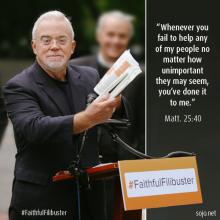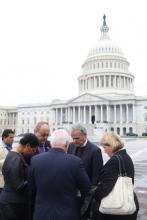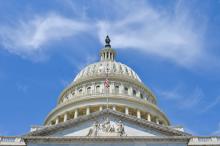Poverty

Editor's Note: Not in D.C., but want to join in the #FaithfulFilibuster? Click HERE to make your voice heard, and spread the word on Facebook by sharing HERE.
On our way over to the Capitol, I re-read the story of the Tower of Babel in Genesis 11. I was struck by the phrase of those building the tall tower "we'll become famous." That sounded a lot like lawmakers and politicians in Washington — it seems that they all want to become famous. In the story, the people were confounded by speaking different languages and their words went past each other. The words of the politicians and pundits are going past each other and their words are not really meant to be understood. They're not meant to find solutions or common ground. These are words that are meant to fight. To win. To defeat. Even, it seems, to foster hate.
The words we're hearing are of politics and punditry, meant to divide and not to unite. The words coming from the top have consequences for those at the bottom. And like Babel, these words are just babble.
We're hearing lots of babble at the Capitol, but across the street, we're trying to hear the word of God — what God says about the people, families, and children who will suffer the most because of Washington's babble. These words aren't just directed to churches and charities about what we should do with the poor. They're about the obligations of kings, rulers, and government to protect the poor.

Thursday marked the tenth day of the government shutdown and the second of the #FaithfulFilibuster — A Vigil for the Poor. People of faith, both across the street from the Capitol Building and across the world on social media, are reading through the more than 2,000 Bible verses that deal with poverty and justice as a witness for those the shutdown is affecting the most.
The rain didn't deter the prayers, as leaders from Sojourners, Bread for the World, the National Association of Evangelicals, the Salvation Army, and more gathered once again to call on Congress to end the shutdown and stop hurting the poor.
They are asking people of faith to reach out to Congressional leadership. Join along with them to Tweet at those members of Congress with your message to them and hashtag #FaithfulFilibuster.
It’s time to end this shutdown. I’m standing in full view of the Capitol Building with a group of clergy and faith leaders who are here to offer a “Faithful Filibuster” of the government shutdown – and we’re going to keep talking until things change.
We know that this shutdown disproportionately affects the most vulnerable in our society. So our words will not be wasted diatribes or placements of blame. Rather, we will use God’s own words – reading the more than 2,000 Bible verses that speak to God’s justice for the poor and vulnerable – until this shutdown ends.
And while we recite the verses to bear witness for those suffering, we want to make sure that every single member of Congress can read them too. It is our goal to send each member a copy of the Poverty and Justice Bible, which highlights each of those 2,000 verses. Our elected officials need this reminder now more than ever.

It’s a rough month to be a Washingtonian.
My morning bike ride past the Capitol Building is leaving me less with the sense of inspiration I used to feel at being so close to the heart of democracy, and more with a creeping sense of disgust. Sometimes it’s tough to live in a city whose very name is a synonym for Congress. “Washington” recently decided to cut off all funding for national parks, health research, and, oh yeah, programs that serve poor Americans.
Thanks to Congress, poor women might not get help from the Women, Infants and Children program to feed their babies. Head Start preschool programs have been canceled, leaving parents unable to work. People who need the SNAP program to feed their families could be left with nowhere to turn, while sick and elderly people who get regular visits from Meals on Wheels volunteers are worried about where their food will come from over the coming weeks.
There are about 40 members of an extremist ideological minority who are ruining the reputation of the place I live and work, and taking the poor down along with them.

WASHINGTON — “All labor has dignity.” That’s what the Rev. Martin Luther King Jr. said 50 years ago, and it’s still as true today.
Yet too many working men and women are unable to live with dignity in a world where the fastest-growing jobs are the lowest-paying ones. Just and living wages are a moral imperative, and workers must earn enough to afford the basics for themselves and their families. That’s why we have come together to support those fighting for a living wage.
As it turns out, the largest low-wage job creator in the country isn’t Wal-Mart or McDonald’s — it’s Uncle Sam. Through federal contracts, loans, and leases, the federal government employs about 2 million low-wage workersacross the country — sewing military uniforms, cleaning the bathrooms at Washington’s Union Station, serving Big Macs at the Smithsonian’s National Air and Space Museum, and hauling federal loads on trucks. Too many of these workers can’t even afford rent and food, they work without any benefits, and often are forced to rely on economic safety net programs like food stamps, Medicaid, and Section 8 housing vouchers to meet their basic needs.
Making matters worse, many of these workers are not compensated for overtime work and are actually paidbelow minimum wage. It’s illegal, but it happens. As faith leaders, we have visited with many of these workers and have asked President Obama to meet with them too.

A straggle of kids came up for children’s time at Poland Presbyterian Church, a 211-year-old congregation established on Lot One, in Township One, in Range One of what was once known as the Connecticut Western Reserve.
The church’s education minister asked them to do this year’s CROP Walk in nearby Youngstown. Two miles, five miles, whatever they can do to raise money for alleviating hunger.
“Seventeen million children will go to bed hungry in America tonight,” she explained.

The message of Christ is not often so clearly presented in American media as it was yesterday, nor is that message as clearly contradicted in the same news cycle.
Yesterday, Pope Francis, while not actually changing any doctrinal stance of the Catholic church, clearly asserted in a rare and frank interview that compassion and mercy must be the light that radiates from the global church for the world to see, rather than the church’s current “obsession” with gays, birth control, and abortion.
At the same time that the pope’s words were cycling through the media, other words were also coming through loud and clear: those of Republican lawmakers who have decided that the least of these will remain just that and, accordingly, voted to slash the food stamp budget by almost $40 billion.
The juxtaposition presented between these two events is striking. It also represents an enormous divide among Christians, and, frankly, demonstrates why so many feel Christianity is a religion full of hypocrisy.

The House of Representatives on Thursday evening narrowly passed a plan that cuts about $40 billion* from the Supplemental Nutrition Assistance Program (SNAP), or food stamps program. The Congressional Budget Office estimates that the move will push nearly 4 million low-income people off of the program in 2014. USA Today reports:
"The House voted 217-210 for the bill that cuts nearly twice as much from food stamps as a bill the House rejected in June. It is also far more than a Senate measure passed earlier this year that would trim about $4.5 billion in spending. The bill failed to draw the support of a single Democrat, many of whom have said the steep cuts would erode a key safety net depended upon by families with children, seniors, veterans and people looking for work."
Earlier on Thursday, Sojourners President Jim Wallis condemned the then-proposed cuts, saying, "These same politicians are not willing to go to where the real money is: the Pentagon budget, which everyone knows to be the most wasteful in government spending, or the myriad subsidies to corporations, including agribusiness subsides to members of Congress who will be voting to cut SNAP for the poor. ... They are going after cuts to the poor and hungry people because they think it is politically safe to do so. So let’s call that what it is: moral hypocrisy."
Check back with Sojourners for details on how your congressperson voted.

If you know the facts and faces of the hungry families that are helped by SNAP, I believe it is a moral and even religious problem to vote to cut them. The Bible clearly says that governmental authority includes the protection of the poor in particular, and instructs political rulers to promote their well-being. So the argument that the poor should just be left to churches and private charity is an unbiblical argument. I would be happy to debate that with any of our conservative Congressmen who keep telling our churches that we are the only ones who should care for the poor. To vote against feeding hungry people is un-Christian, un-Jewish, and goes against any moral inclination, religious or
Finally, for politicians to defend these SNAP cuts because of our need to cut spending generally is un-credible and incredible.
These same politicians are not willing to go to where the real money is: the Pentagon budget, which everyone knows to be the most wasteful in government, or the myriad subsidies to corporations, including agribusiness subsides to members of Congress who will be voting to cut SNAP for the poor.
Tea Party-elected Rep. Stephen Fincher, (R-Tenn.), who likes to bolster his anti-poor rhetoric with misused Bible verses, collected $3.5 million in farm subsidies between 1999 and 2012, according to the New York Times. Fincher is helping to lead the effort to cut food stamps to working families with children by illogically quoting: “The one who is unwilling to work should not eat,” all the while collecting millions of dollars in agricultural subsidies. Congressman Fincher's position is hypocritical — and it's this kind of hypocrisy that makes Christians look bad and turns young people away from the church.
You see, for many House conservatives this isn't really about SNAP, but about their opposition to the idea that as a society we have the responsibility to care for each other, even during the hard times or when resources are few. Conservatives know their ideas for privatizing Social Security or cutting funding to Medicare and Medicaid are politically unpopular, but their ideology of individualism that borders on social Darwinism remains unchanged. SNAP is the perfect target for them. The image of what it does and whom it serves has been widely distorted by the media, while the people who benefit from it have little influence in the halls of Congress and pose little risk to the political careers of Republican members.

House leaders are proposing a massive cut to SNAP (Supplemental Nutrition Assistance Program), America’s frontrunner in combatting hunger. This new proposal consists of a $40 billion reduction in funding, and SNAP households across the board would be feeling the pinch beginning as soon as November.
Potential cuts reveal stark and sobering statistics that millions of Americans would face:
- The average benefit per person, per meal would decrease to below $1.40, dangerously low to maintain the minimum standards of a healthy diet;
- 210,000 kids would be cut from free school meals;
- SNAP cuts would be the equivalent of taking away 21 meals per month from a four-person household; and
- 170,000 veterans would lose out on food benefits.

There is no longer a war on hunger in this country.
There is no longer a war on poverty.
There is a war on the hungry.
There is a war on the poor.
It is being waged all over the country with the most recent — and visible — battle coming from Raleigh, N.C., and the now-viral incident with the Rev. Hugh Hollowell’s Love Wins ministries.
It’s ironic, really.
Conservatives love to tell folks that the best way to end poverty, homelessness, and need in our country is through the work and generosity of private individuals and private donations, not through government programs.
The answer, they say, is charity.
Yet in a stroke of cruel hypocrisy, when charities actually address these issues in real life, they aren’t commended for their work.
Rather, they are threatened with arrest.

I got a glimpse into the politics of scorn this week.
The visual was a photo accompanying a New York Times article on rental properties in Memphis, Tenn. The article itself seemed innocuous, about how foreclosed homes are being scooped up by outside investors and turned into rentals.
The photo, however, was troubling. It showed a young man lazing in a large chair while his two children stared numbly at a television screen and his wife tapped away on a cell phone.
I have no clue into this family’s character. But the visual screamed: “Idle! Lazy!”

Too much religion can harm a society’s economy by undermining the drive for financial success, according to a new study in the journal Social Psychological and Personality Science.
The study of almost 190,000 people from 11 religiously diverse cultures is raising eyebrows among some of England’s religious leaders for suggesting Judaism and Christianity have anti-wealth norms.
THE LEADERSHIP of 12Stone Church, a multi-campus congregation based in Gwinnett County, Ga., became increasingly concerned about how home foreclosures, rampant unemployment, and other financial strains were impacting families in metro Atlanta. They set an ambitious goal of providing relief to 5,000 families in their church and community. Eventually they raised more than $550,000 through designated gifts, many from church members who were themselves unemployed.
Partnering with the HoneyBaked Ham Company, Kroger grocery stores, and other area sponsors, the 12Stone Church members distributed food to needy families, culminating with a day of giveaways in the parking lot of Coolray Field, home to the Gwinnett Braves, the local minor league baseball team. People began lining up hours before the event, jamming traffic on nearby I-85. Others slept in their cars overnight to keep from missing out.
Imago Dei Church in Raleigh, N.C., has mercy ministries built into the DNA of the church. They’ve adapted Rick Warren’s PEACE Plan: plant churches, evangelize the world, aid the poor and sick, care for the orphan and the oppressed, and equip leaders.
Working through the Raleigh-based nonprofit Help One Now, Imago Dei is partnering with an orphanage in Haiti and sponsoring children. Through this ministry, the church is providing basic needs, including food, clean water, and health care. They also support education programs so that the children will be equipped to one day provide for their own families.
The United Nations issued a report on Wednesday stating that the number of civilians killed or wounded in Afghanistan rose by 23 percent in the first six months of 2013, with women and children faring the worst — killed by roadside bombs almost every day. An earlier UN report noted that
"Afghanistan remains one of the most dangerous places in the world to be a child."
Over a third of Afghans are living in abject poverty, violence is escalating as NATO forces withdraw, and years of international aid has done little to decrease the abuse of women and children.
Click here to see the Atlantic's photos series on Afghan children.

I used to be a Bible study leader.
And per the undergraduate campus fellowship tradition, it kept me busy: Sunday brunch community building, Monday night small groups, Tuesday leadership meetings, and Wednesday training sessions. Discipleship, one-on-ones, social activities, all-campus worship, weekend retreats, week-long retreats, all-day retreats, evangelism workshops, work day, capture the flag, scavenger hunts, and prayer meetings.
But what I remember most vividly are Thursdays.
Every Thursday. The evening walk through campus, past bars and restaurants beginning to fill with my peers, through a door almost hidden to the unaware, flanked by a man sitting on the ground. The man is dirty and unkempt. Sometimes he’s panhandling. Sometimes he’s asleep. On one occasion, he eats, still alone, from a small bag of popcorn one of my fellow Bible study leaders had brought to him.
The man catches my attention, yet I don’t show it. I don’t ask his name, or where he goes when he doesn’t sit by the door, or how he manages to stay warm through Midwestern winters. Thursdays are obligatory for Bible study leaders, so maybe that’s why I try to ignore the man. Maybe that’s why I feel I can’t stop to ask him his name. Or maybe being a Bible study leader is just a convenient excuse to keep walking.
So every Thursday I climb the stairs behind that door, leaving the man below, allowing him to fade into the background until he is just another distant person, indistinguishable from those filling the pub across the street or sleeping on their textbooks in the library across the quad. Suddenly the band is on stage, the rhythm of worship distracts me, channeling an energy that gives way to reflection, to reverence, to calm. Every Thursday.
And then it’s over. And like all good Bible study leaders, I greet friends, practice fellowship, welcome newcomers. We leave in groups to study or socialize. I don’t notice if the man is still there when we leave.
This man has come to represent many things to me in my faith journey, and something I’ve encountered this week brings my thoughts back to him.

Jesus calls us to help the poor. That is a point that few would debate. One key indicator of our obedience is how we treat the poor and vulnerable among us. Where we fall into debate is how to do it the most effectively.
One thing that gets lost in the rhetoric is that many of the solutions we have are already effective — they just need to be improved. And we have plenty of ideas that already help lift families out of poverty while encouraging them to work. Sounds perfect, right?
The Earned Income Tax Credit (EITC) is one such program. It provides a tax credit based on how much income a worker takes in — the more income they take in, the more benefit they get, up to a maximum point when it starts to phase out. This gives working people incentive to keep working rather than rely on assistance alone.

Once we have decided to follow Jesus, we cannot help but live out our personal beliefs in public ways. The demands of the Gospel refuse us the option of a purely inward spirituality.
While there are times when those in power listen to the guidance of moral and religious leaders, far too often we’re asked to be prophets. In the face of opposition, we pick up our crosses and lift up our voices on behalf of the disadvantaged.
In North Carolina, pastors and civil rights leaders, along with thousands of others, have been living out their personal faith in a very public way. Since late April, dozens of faith leaders and hundreds of others have been arrested at the state capitol as part of an ongoing protest call “Moral Mondays.” What would motivate these leaders to take such a strong stand at such a personal cost?

Go Here to read the second in this series, Competing for the Greater Good
Peru is a land of extremes, especially for a motorcycle pilgrimage. Our journey from Lima to the orphanage in Moquegua took us through some of the most severe riding conditions imaginable. Storms of Peru, the second segment in the Neale Bayly Rides series, provided a glimpse into the challenges we faced, as Peru would not give up her beauty easily.
Our ride began in the congested, chaotic streets of Lima — a thriving metropolis of 16 million people — where an aggressive riding posture is your only chance for survival. It’s not that the Peruvians are bad drivers; it’s just that traffic laws don’t seem to be a concern for any of them. Riding through the boiling cauldron of cars felt like a massive vehicular free-for-all. Lima provided a baptism by fire for our adventure and, exciting though it was, we were glad to leave the haphazard traffic behind us.
We rode south toward the beautiful but haunting desert of Ica. The life-smothering heat and blowing sands sweep across the land and stop abruptly at the Pacific Ocean. Riding through the rugged terrain of crushed rock, sugar sand, and loose gravel was even more challenging than it appeared on television. I was glad the production team didn’t show everything. I bit the dust more times than I care to admit.
The country is amazingly beautiful, as are the people. There's a crazy juxtaposition of things you have to see to believe — poverty mixed with joy, beauty and brokenness in the very same face, a fierce gratitude in the meanest of circumstances.

The ONE Campaign, co-founded by music legend Bono of U2, has launched a new platform to promote global messages of social justice, women’s rights, and putting an end to apartheid, war and poverty — just to name a few.
The campaign, agit8, features new covers of famous protest songs throughout history by contemporary musicians ranging from Mumford & Sons to Greenday.
With the stated goal of ending poverty by 2030, agit8 is timed to coincide with the upcoming G8 summit next week. Noting the impact protest music has had on American history, agit8 encourages artists to “get on their soapbox” and amplify “the voices of those who spoke up for social change throughout history.”